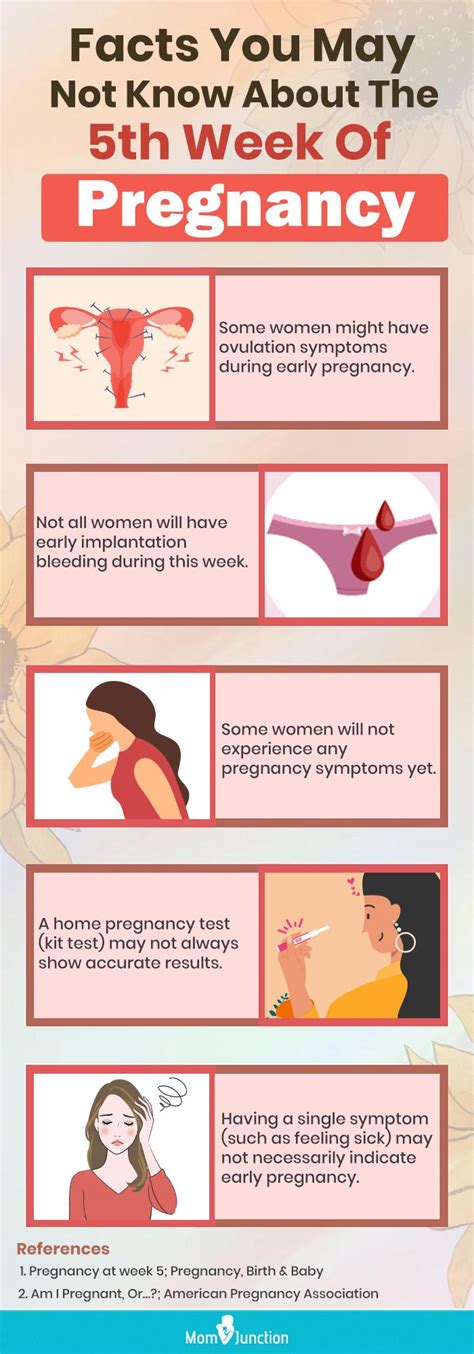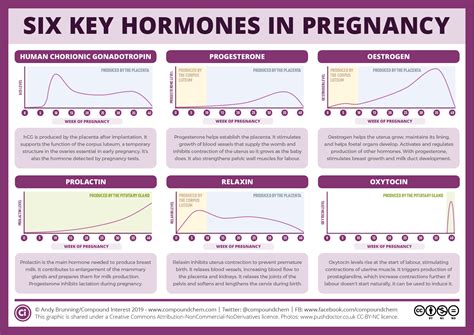Intro
Discover common 5 weeks pregnant symptoms, including morning sickness, fatigue, and mood swings, as your embryo implants and hormone levels surge, marking the start of a life-changing journey with early pregnancy signs and bodily changes.
At 5 weeks pregnant, many women are eager to know what to expect and how their body will change. This period is crucial, and being aware of the symptoms can help expectant mothers prepare and ensure a healthy pregnancy. During the fifth week, the embryo's major organs and body systems begin to develop, and the fetus's heart starts to beat. Although every pregnancy is unique, there are common symptoms that many women experience at this stage.
The early signs of pregnancy can be misleading, as they often resemble premenstrual symptoms. However, as the embryo implants in the uterus, hormonal changes become more pronounced, leading to distinct symptoms. At 5 weeks pregnant, some women may still be unaware that they are expecting, especially if they have irregular periods or are not actively trying to conceive. It is essential to recognize the early symptoms to seek medical attention and begin prenatal care.
As the body adapts to the growing embryo, women may experience a range of physical and emotional changes. The fifth week of pregnancy is a critical period, and understanding the symptoms can help expectant mothers navigate this journey. From mood swings to physical discomfort, being informed about the common symptoms can alleviate anxiety and ensure a healthy pregnancy.
Early Symptoms of Pregnancy at 5 Weeks

At 5 weeks pregnant, women may experience a combination of physical and emotional symptoms. Some of the early signs include:
- Mild cramping: As the embryo implants in the uterus, women may feel mild cramping or twinges in the lower abdomen.
- Spotting or light bleeding: Implantation can cause light bleeding or spotting, which may be mistaken for a light period.
- Breast tenderness: Hormonal changes can lead to breast tenderness, swelling, or darkening of the nipples.
- Fatigue: As the body supports the growing embryo, women may feel more tired or exhausted.
- Mood swings: The surge in hormones can cause emotional changes, leading to mood swings, irritability, or anxiety.
- Bloating and cramping: Similar to premenstrual symptoms, women may experience bloating, cramping, or gas.
Physical Changes at 5 Weeks Pregnant

As the embryo develops, women may notice physical changes that can be both fascinating and challenging. Some of the common physical changes at 5 weeks pregnant include:
- Uterine expansion: The uterus begins to expand, which can cause mild cramping or discomfort.
- Cervical mucus: The cervix produces more mucus, which can appear cloudy, white, or off-white.
- Breast changes: The breasts may become more tender, swollen, or lumpy due to hormonal changes.
- Digestive changes: Women may experience constipation, bloating, or gas due to the increased levels of progesterone.
Pregnancy Hormones at 5 Weeks

The fifth week of pregnancy is characterized by a significant surge in pregnancy hormones. The two primary hormones responsible for the symptoms and physical changes are:
- Human chorionic gonadotropin (hCG): This hormone is produced by the placenta and helps maintain the pregnancy. hCG levels peak around 10 weeks of pregnancy.
- Progesterone: This hormone helps prepare the uterus for implantation and supports embryonic development. Progesterone levels increase throughout pregnancy, causing various physical and emotional symptoms.
Emotional Changes at 5 Weeks Pregnant

The emotional changes experienced during the fifth week of pregnancy can be intense and unpredictable. Women may feel:
- Mood swings: The hormonal fluctuations can cause sudden mood changes, irritability, or anxiety.
- Anxiety: The uncertainty and excitement of pregnancy can lead to anxiety or worry about the future.
- Excitement: The joy and anticipation of having a baby can create feelings of excitement and euphoria.
- Emotional sensitivity: Women may become more emotional, sensitive, or reactive to their surroundings.
Self-Care During the 5th Week of Pregnancy

Practicing self-care is essential during the fifth week of pregnancy. Some ways to prioritize well-being include:
- Staying hydrated: Drinking plenty of water can help alleviate symptoms like bloating and constipation.
- Eating a balanced diet: Consuming a nutrient-rich diet can support embryonic development and overall health.
- Engaging in gentle exercise: Prenatal yoga, walking, or swimming can help reduce stress and promote physical well-being.
- Getting enough rest: Prioritizing sleep and taking naps can help manage fatigue and emotional changes.
Preparing for Prenatal Care

As the pregnancy progresses, prenatal care becomes increasingly important. Women should:
- Schedule a prenatal appointment: Typically, the first prenatal visit occurs between 6-10 weeks of pregnancy.
- Discuss medical history: Sharing medical history, including any pre-existing conditions or previous pregnancies, can help healthcare providers create a personalized care plan.
- Ask questions: Expectant mothers should feel empowered to ask questions and address concerns with their healthcare provider.
Common Concerns at 5 Weeks Pregnant

At 5 weeks pregnant, women may have various concerns, including:
- Miscarriage: The risk of miscarriage is higher during the first trimester, and women may worry about the health of their pregnancy.
- Bleeding or spotting: Light bleeding or spotting can be alarming, but it is often a normal symptom of implantation.
- Morning sickness: Although morning sickness typically begins around 6-8 weeks, some women may experience nausea or vomiting earlier.
Staying Informed and Connected

Expectant mothers can stay informed and connected by:
- Reading pregnancy books and online resources
- Joining pregnancy support groups or online forums
- Downloading pregnancy apps to track symptoms and development
- Sharing experiences and concerns with healthcare providers or loved ones
As the pregnancy journey unfolds, women can expect a range of physical, emotional, and lifestyle changes. By understanding the symptoms, hormonal fluctuations, and self-care strategies, expectant mothers can navigate the fifth week of pregnancy with confidence and excitement.
What are the most common symptoms at 5 weeks pregnant?
+The most common symptoms at 5 weeks pregnant include mild cramping, spotting or light bleeding, breast tenderness, fatigue, mood swings, and bloating.
How can I manage morning sickness at 5 weeks pregnant?
+Although morning sickness typically begins later, some women may experience nausea or vomiting at 5 weeks. To manage symptoms, try eating small, frequent meals, staying hydrated, and avoiding triggers like strong smells or spicy foods.
Is it normal to experience bleeding or spotting at 5 weeks pregnant?
+Yes, light bleeding or spotting can be a normal symptom of implantation at 5 weeks pregnant. However, if the bleeding is heavy or accompanied by other symptoms like pain or fever, seek medical attention immediately.
How can I stay informed and connected during my pregnancy journey?
+Expectant mothers can stay informed and connected by reading pregnancy books and online resources, joining pregnancy support groups or online forums, downloading pregnancy apps, and sharing experiences and concerns with healthcare providers or loved ones.
What are some essential self-care strategies for the 5th week of pregnancy?
+Essential self-care strategies for the 5th week of pregnancy include staying hydrated, eating a balanced diet, engaging in gentle exercise, getting enough rest, and prioritizing emotional well-being.
As you continue on your pregnancy journey, remember to stay informed, prioritize self-care, and connect with loved ones and healthcare providers. By doing so, you can ensure a healthy and happy pregnancy, and prepare for the arrival of your little one. We invite you to share your experiences, ask questions, and join the conversation in the comments below.
